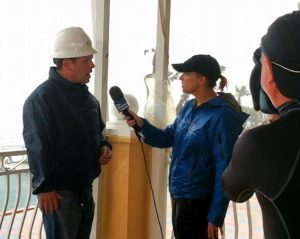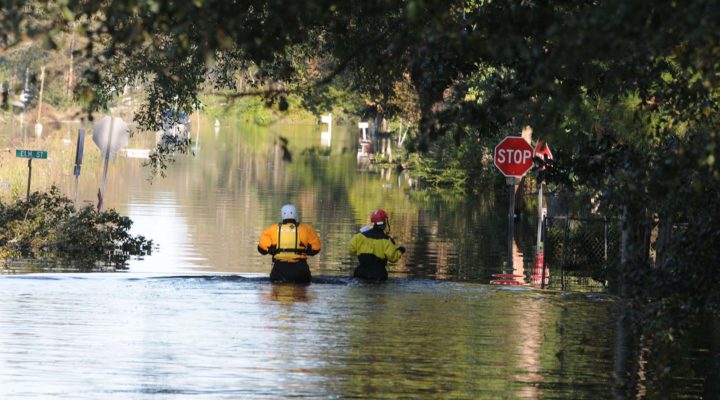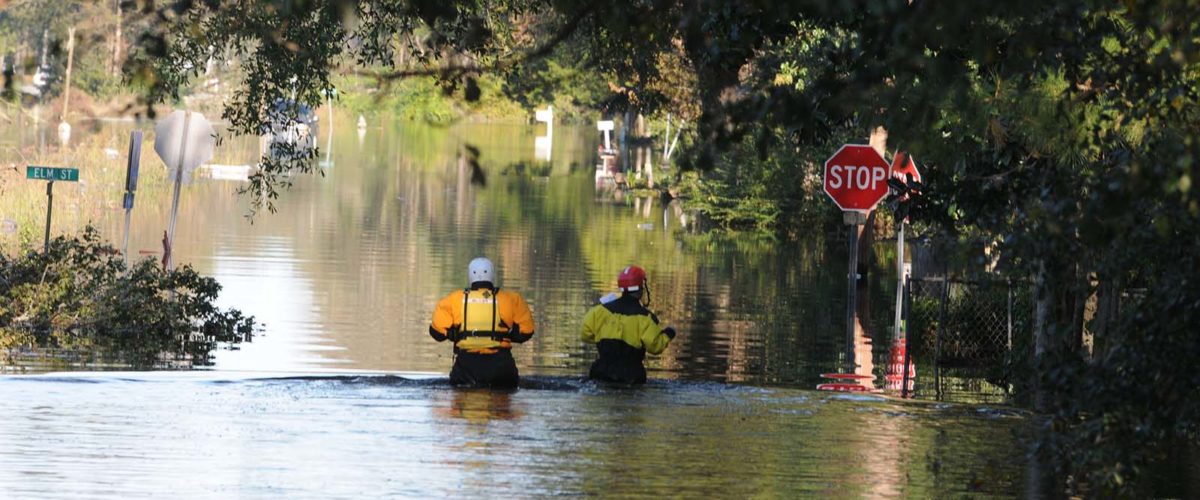In North Carolina, Hurricanes Fran in 1996 and Floyd in 1999 sat atop the honor roll of calamity for 20 years.
Hurricane Matthew has knocked them off the mountain.
A week after Matthew lashed eastern North Carolina, some rivers in the broad, flat region still had not crested and floods soaked thousands of homes, destroying roads, cutting off I-95 — the main north-south artery from New York to Miami — closing schools and universities and leaving tens of thousands of residents shaking their heads and digging through mud looking for a morsel of hope.
Flooding is like no other natural disaster. Residents cannot prepare for a flood by battening down hatches or cutting a fire line. No manner of sand bagging can stave the relentless rise of water that lifts silt and debris, drowned animals, waste from overwhelmed sewage plants and hog waste lagoons into houses as much as eight feet up the walls.
Lee Colbert, pastor of First Baptist Church in Smithfield, just south of Raleigh, said 15 to 16 inches of rain fell there. For six hours water flowed past his driveway at a pace he could have taken for a thrill ride on an inner tube.
Families that raised their houses as much as six feet after Hurricanes Fran and Floyd still had water damage in their duct work and insulation.
One church family lost a million dollars of merchandise in their warehouse that, until Matthew, was not even considered close to flood danger.
Flood stage for the Neuse River through Smithfield is 15 feet. It crested at 29.2 feet.
Colbert expects First Baptist Church to be used as a disaster relief site when recovery efforts get into full swing. It hosted recovery workers for two months after Floyd and Fran.
The church held worship services Sunday, Oct. 15, and people attended from many denominations, Colbert said, “Because they know we’re going to have church, no matter what.”

Jeff Brooks, a Baptist and spokesperson for Duke Energy interviewed by media. (Photo courtesy of Jeff Brooks)
Jeff Brooks, a Baptist layman and spokesman for Duke Energy, which is the primary power provider for both North Carolina and Florida, said local response to the flooding has brought out “the beautiful nature of people.”
“I’ve seen people coming together to help one another, churches and community groups standing side by side with local leaders to get food and supplies to people.”
“You always see this [destruction] in these types of storms,” said Brooks, a member of Hayes Barton Baptist Church in Raleigh, “but also a shining moment that brings out the best in us.”
Brooks said despite the pain he witnesses as the on-site spokesman for Duke Energy he sees “again and again amidst these tragic circumstances people who care. I see this compelling need and urge to do something that matters. That is so encouraging to us as a society and a people to see that within us we have that innate desire to help others.”
Steve Devane, a Baptist and reporter for the Fayetteville Observer, ran ragged for two weeks covering disaster in the region. First came a “train rain” event that “dumped box cars” of 10 to 11 inches of rain in six hours, causing flooding ahead of Hurricane Matthew’s wind damage. Then came the rising floodwaters that inundated miles of southeastern North Carolina.
Hurricane Matthew originally did not pose a catastrophic profile. But Devane, who has covered natural disasters for decades in his work, said, “I wouldn’t be surprised if Matthew will be mentioned in the same breath as Floyd and Hugo” as some of our worst weather disasters ever.
The Neuse River actually crested at a higher level than during Floyd. At least the Floyd experience taught most people in the potential flood area to evacuate when encouraged to do so by emergency officials.
Floyd flooding was labeled at such a severity that it would happen only once in 500 years. Seventeen years later Matthew hit — and it’s worse.
Baptist Men, which is the third largest disaster relief provider in the country after the Red Cross and Salvation Army, was immediately in the area with feeding units and doing assessment for recovery. But they already are stretched thin, being involved in flood recovering Louisiana and West Virginia.
Oakmont Baptist Church in Greenville and First Baptist Church in Wallace are hosting feeding sites.
First Baptist Church in Lumberton is hosting a Mennonite disaster response team.
Brooks said some residents might not get power back for weeks “because we can’t get to it in dangerous spots.” He recognizes that “electricity is not a convenience for most people. It’s a necessity to exist in the modern age.”
“We have a tendency to forget about a crisis when it’s no longer relevant to us,” Brooks said. “That struggle will continue on sunny days when our lives are back to normal.”
Normal is far away for the 80-year-old member of Colbert’s church with 10 feet of water in her basement — and who forgot to pay her flood insurance last year.
Summing up the resilient spirit of victims, Colbert said one of his members who had lost virtually everything said, “You have a bad picture and you can’t change that, but you can change the frame you put it in.”


